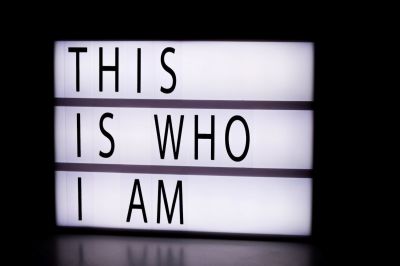Do you know who I Am?

At an airport recently where we were experiencing bad weather and subsequent flight delays, I overheard a first-class passenger haranguing the customer service representative about his need for a plane. She patiently explained that all the other passengers were in the same situation and there was nothing she could do. He responded that he was in first class and had an important meeting to get to. When she continued to explain that she couldn’t help him, he repeatedly asked “do you know who I am?!” as if his renown would make all the difference.
She said “I have an idea. Wait here while I make a gate announcement.”
As she got on the intercom, she announced yet another flight cancellation, then also asked for the public’s help in assisting a fellow passenger. “I have a gentleman here who doesn’t know who he is. Can anyone help identify him?”
While that’s a humorous anecdote, it got me thinking, does this guy represent mankind today? Have we become so arrogant, impatient, self-centered and oblivious to others that we expect everyone to recognize and serve us? I fear that far too often, especially here in the United States, we believe that we are all special and should be treated as such. We feel that nothing should ever go wrong for us, and if it does, it surely isn’t our own fault. We seek to blame either our political system, social structures or anyone who might disagree with us about how things should be managed.
What if, like Job, we were to have all of the trappings stripped away? Without our worldly goods, our role in society, our families or our health, how would we respond? While Job was understandably upset, he never went so far as to “curse God and die,” as his wife encouraged him to do. But he did have some questions for God, as I expect many of us would.
However, it was God’s questions back to Job that helped him to put it all in perspective. As the Creator of the Universe, He alone has the right to ask, “Do you know who I am?” Job was reminded of mankind’s place and God’s sovereignty, for which he was still able to praise God despite his circumstances.
“Where were you when I laid the earth’s foundation?” God asked in Job 28. “Have you ever given orders to the morning, or shown the dawn its place?” He continued. “Can you bind the chains of the Pleiades? Can you loosen Orion’s belt?”
These questions clearly put Job — and us — in our place. Who are we, in light of that? We are God’s creation, He formed us and the world we inhabit, and we must acknowledge that. All that we have we receive from Him, and it is we who must grow in our knowledge of Him.
How can we do this? By reading the Bible — it is through its pages that we can become intimately acquainted with the maker of the universe. But we must approach it with a childlike reverence for the One who is so much greater than us. And we must have a child’s unquenchable thirst for knowledge.
Children are often far more perceptive than adults when it comes to spiritual matters. They understand the Scriptures literally, not trying to complicate them or question God’s intent. This is why it is so important that we reach young people with God’s Word, to plant those seeds early, before they become cynical and self-centered, believing it’s all about them rather than all about who God is.
That is the point of our Bibles for Kids campaign at EEM (Eastern European Mission), where we hope to provide a copy of God’s Word, free of charge to every child and teen in Eastern Europe who wants one, in their heart language. We have once again launched our annual matching gift campaign toward that goal, and are praying that many believers will join us in helping to reach the young people in this region before they are influenced by the world around them to become self-focused and no longer sensitive to the God of the universe, who is knocking at their heart’s door. “Do you know who I Am?” God asks. Let’s help them answer, “Yes, Lord.”
Bob Burckle is President of EEM (Eastern European Mission), which has been providing Bibles and Bible-based materials to the people of Eastern Europe since 1961, now reaching 32 countries in 25 languages. EEM distributed 1.95 million books in 2022 – all free of charge. See more at www.eem.org




























